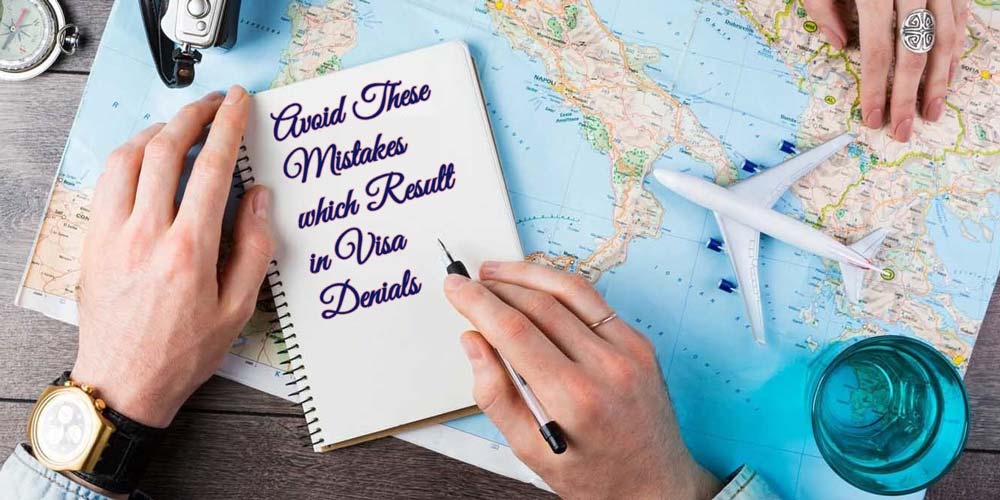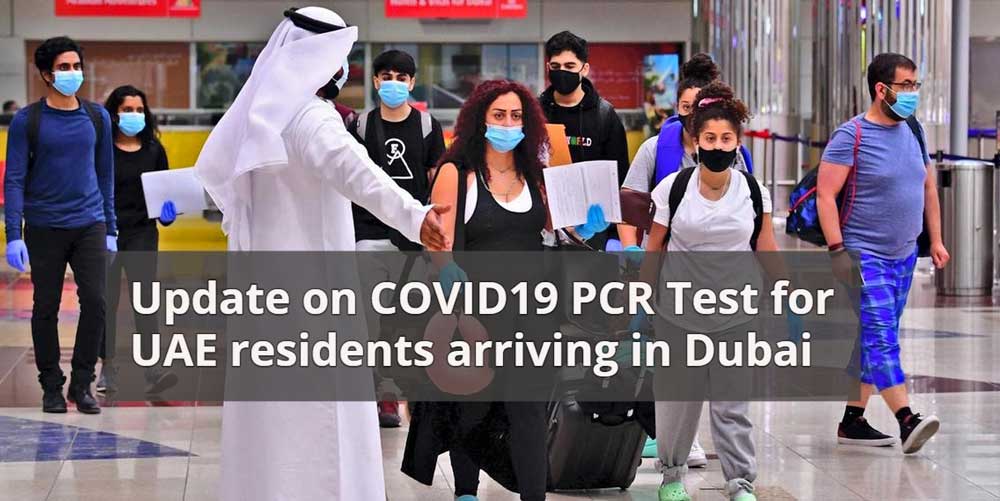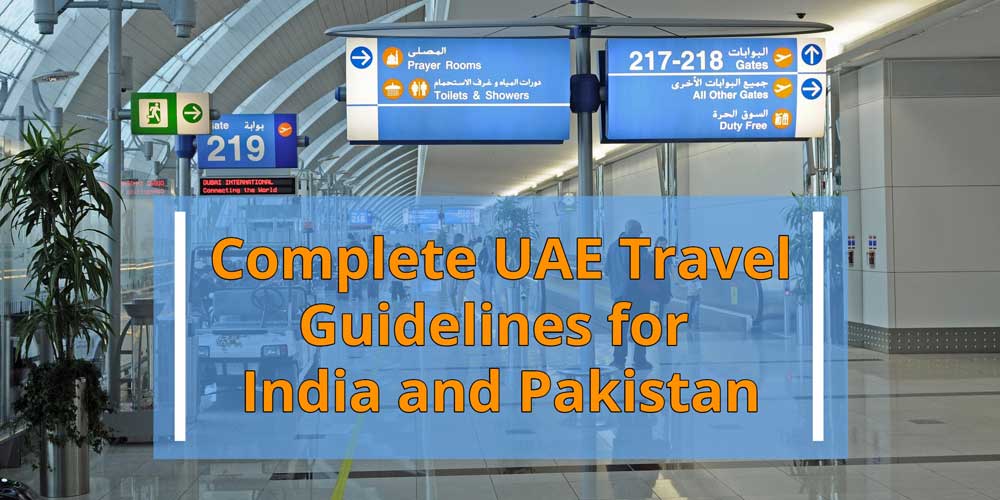Around Around the world, national embassies receive millions of visa applications annually. But not all of them get approved. Many are rejected. Some don't heed visa regulations, while others hide vital information. All this and many more result in visa denials. While applying for a Dubai visa, strictly following the instructions and being alert to updates is imperative. Even after doing so, if your visa gets rejected, you need to understand your application or documents' flaws while applying.
25 Mistakes to Avoid on Your Dubai Visa Application Form lets take a look…
1. Not eligible
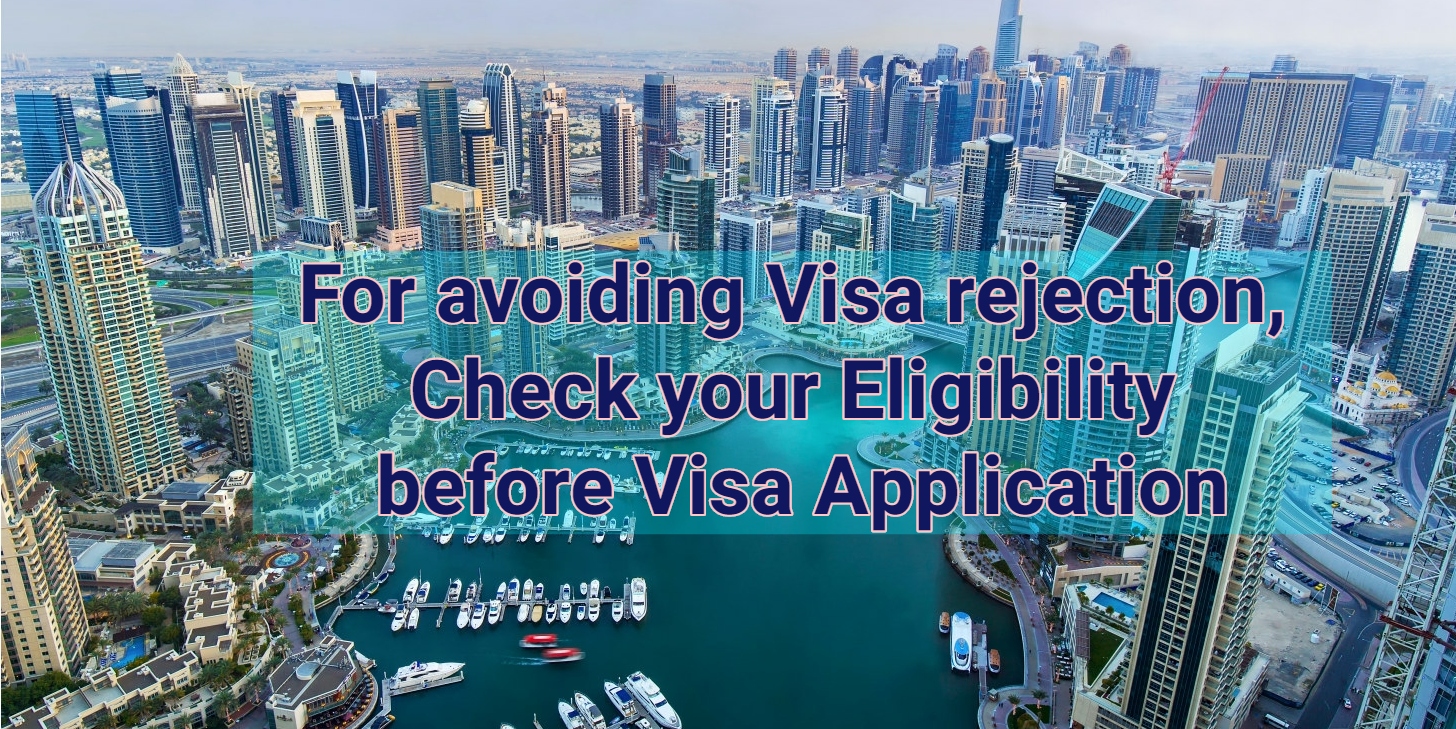
Different countries worldwide have set different criteria for applying for any particular visa. They have set these according to their travel policies and border restriction directives. Knowing whether your country or nationality falls within those criteria is very important. Your Dubai Visa Application Form will be rejected if you are not eligible.
2. Incomplete forms or blank spaces
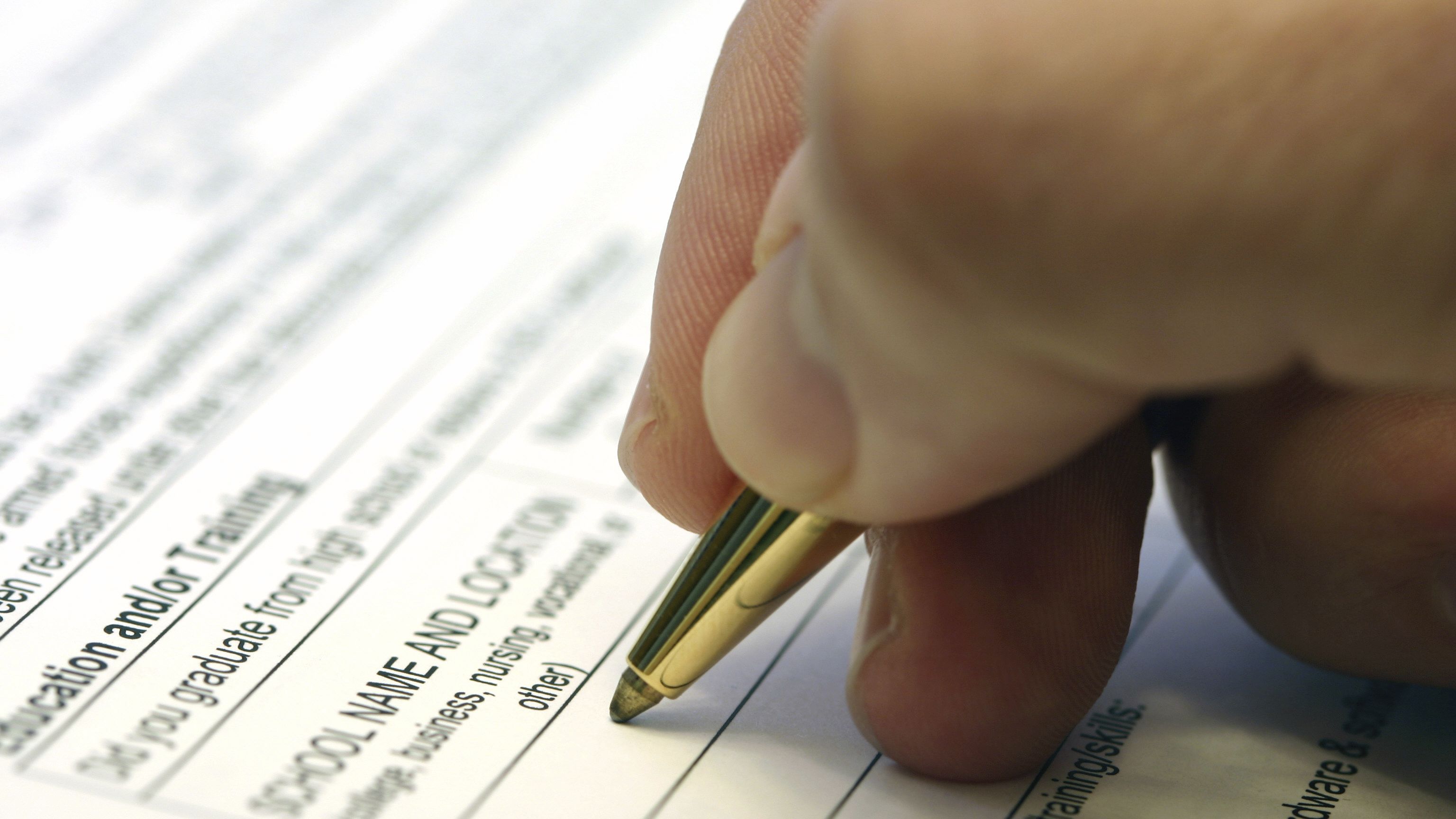
Remember, every space provided to fill in must be duly filled with accurate information. When you leave any space blank, it gives an incomplete message to the embassy about your personal or travel information. It could be your sponsor information, too. You might even feel that signing on so many pages is useless. But little do you know that every space is provided with a purpose. It has significance in the application process to avail online Dubai visa. Leaving such spaces becomes the only reason to deny you a visa. Do note that even if you do not belong to a certain category or if the question is irrelevant, fill it up with N/A, but don't leave the space blank.
Read also: How to Apply for Dubai Visa Online
3. Providing false information
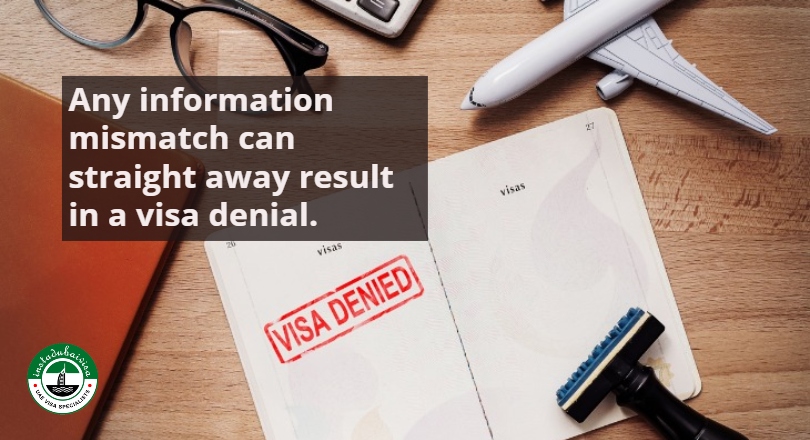
The The information in your application is an important key to your profile. Any information mismatch can straight away result in a visa denial. Visa officials have immense experience ruling out any visa application that contains or displays incorrect or false information about the application. So, don't pass on false information if you want visa approval. Any document supporting false or fake information will immediately call for visa rejection.
4. Fail to explain the purpose of your travel
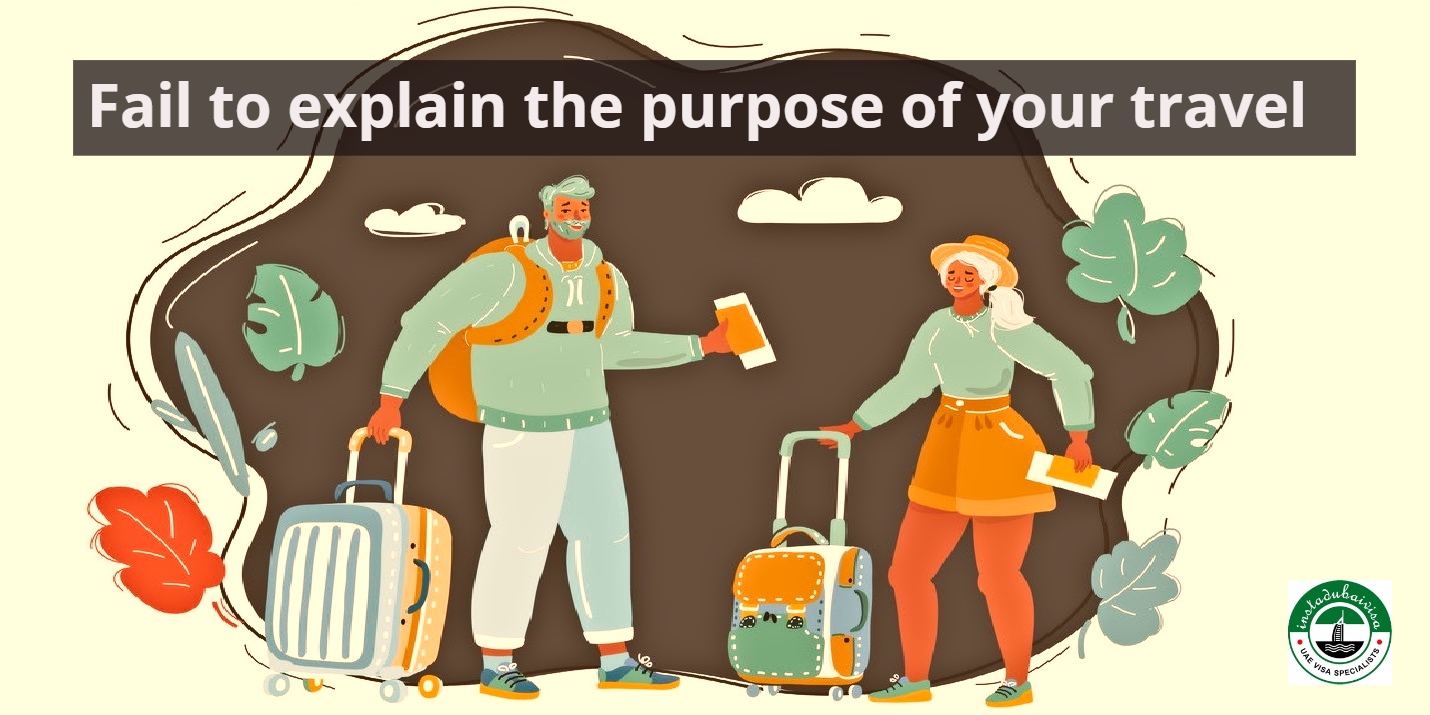
This is one of the most prominent reasons for visa rejections. If you wish to travel, attach your hotel bookings, an accurate travel itinerary, and any tickets to attractions booked in advance. The absence of a personalized cover letter that clearly states your purpose of visit adds to many doubts in the minds of visa officers. Your intentions for a visit should be clear and not mixed up with some other purpose. If you plan to visit your family, specify the relationship with your family member and provide enough documentation of the family residing in the destination you are heading to.
5. Incorrect or long itinerary
If you have a stay validity of 30 days Dubai visa and provide an itinerary for 45 days, your online Dubai visa is bound to be rejected. This would raise false doubts about your invalid stay. Additionally, an incomplete or incorrect itinerary will take away the visa official's interest in paying attention to your application. And it might get denied.
6. Submission of bad quality documents
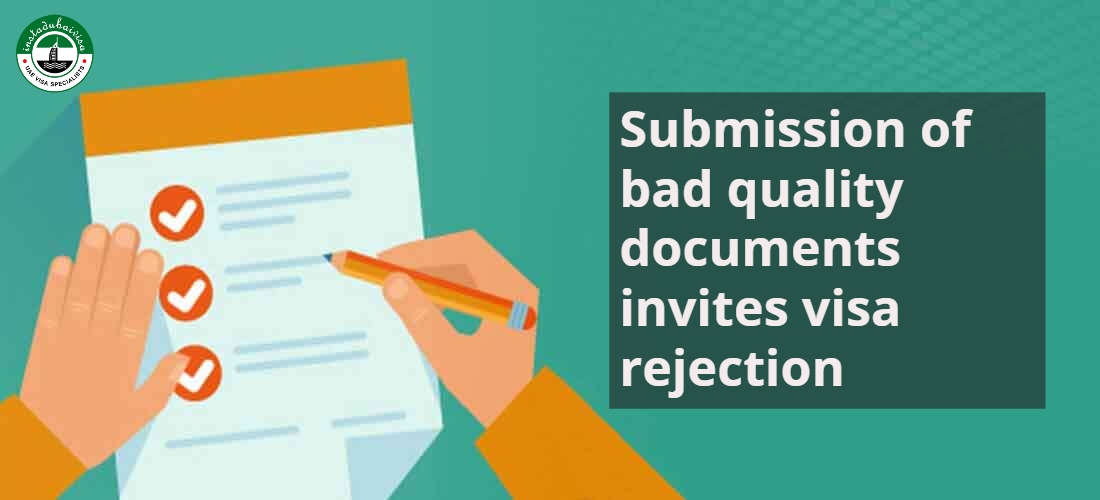
The documents you submit and the application carry crucial information about your identity and travel. Poor visibility or quality will invite visa rejection as the officials cannot decode important details. The embassy of many countries is strict about the format in which the document needs to be submitted. Failure to do this will result in visa rejections.
Read also: Business Visa for Dubai (UAE)
7. Lack of required funds
Your visa application will require documents that explain your financial stability. If found insufficient, there are chances that your online Dubai visa might not get approved. Providing the correct source of income as a requirement is different for different countries. Several sources, like bank statements, investments, FD's, and share certificates, facilitate such requirements.
8. Criminal record
The single most crucial reason for visa rejection is a crime committed by the applicant. You will be denied access to a country if you are involved in such activities.
Read also: Dubai/UAE Visa Requirements for Oman Residents
9. Bad interview

Your meeting with the visa officer is an important one. Any misbehavior or nervousness will cause trouble earning a country's visa. Providing or committing any act of a criminal nature, like delivering false information or a fraudulent act, can lead to permanent disapproval of a visa. A well-mannered applicant with an optimistic approach gains brighter chances for visa approval.
10. Applying From a Foreign Nation
Obtaining a travel visa while residing outside your nation of origin is more challenging. Although applicants from "third countries" typically have greater rejection percentages, navigating this during the application process and getting approved is still feasible.
11. Applying From a Nation Where Rejection Rates Are High
The average rate of denied travel visas is higher in some nations than others. When filing from a high-risk country, it might be challenging to prevent a refusal; nonetheless, it usually helps to put together the best application you can and acquire more proof to back it up. See these pointers for obtaining a travel visa.
12. Previous Visa Rejection
Your chances of having your application for a travel visa denied again may increase if you have previously been denied one for entry into the United States. If you are denied, it is advisable to ask the visa officer to explain the reason for the denial so that you can improve your next application and, if at all possible, steer clear of the mistakes you made in the past.
13. Prior Immigration Violations
Prior immigration offenses may also increase your likelihood of having your travel visa denied, just as a previous visa rejection. For instance, if you have previously overstayed a temporary visa, such as a tourist visa or student visa, immigration officials can presume that you will breach its terms should your new travel visa be granted. To prepare for future applications, educate yourself on typical immigration offenses, including "unlawful presence" and visa overstays.
14. Not Fulfilling the Health Requirements
Before a visa may be granted, several nations have health requirements that must be met. The application may be rejected if these conditions are not met. Before applying, checking that the health standards are met is crucial.
15. Ignoring Professional counsel
Obtaining expert advice from an immigration consultant will guide you to avoid mistakes and improve your chances of success during the complicated process of the Dubai Visa Application Form. Immigration professionals can help you comprehend the requirements and required paperwork for the visa application and assist you through the process.
16. Applying for the Wrong Visa
This is a mistake that a lot of people make as well. Each nation has various visa classifications, and if you apply for the incorrect visa, it may be rejected immediately. For example, If you apply for a 14 days Dubai visa, your stay must be at most 14 days. Learning about and comprehending the various visa types available is crucial to selecting the appropriate visa category according to your itinerary.
17. Leaving it too close to the departure date
The time it takes to process a visa application varies from nation to nation and is also influenced by the seasons when travel is most popular. Travelers often wait until the last minute to apply for an online Dubai visa, which gives them little time to carefully review the checklist and ensure all the requirements are completed. Obtaining a visa far in advance and having enough time to handle unforeseen delays is possible, as most countries allow applications up to ninety days before travel.
18. Insufficient Language Ability
Your visa rejection is possible if you cannot communicate clearly in the language of the nation you visit. Verify that you can communicate effectively in the target language or arrange for a trained translator to travel with you (this applies only in certain circumstances).
19. Security Risk
Your visa application may be rejected if you pose a security concern. This could involve worries about your political inclinations, criminal record, or other aspects. It's crucial to get guidance from a reputable government organization or an experienced immigration lawyer if you have any questions regarding your security status.
20. Not Showing Up for Visa Interviews
Your Dubai Visa Application Form may be rejected if you are obliged to attend a visa interview and choose not to do so. Ensure you know what to bring to any discussions, and arrive on time if you have one scheduled.
21. Political Issues
Your application for a visa may be rejected if there are political problems between your country and the country you want to visit. It's critical to keep up with political developments and how they can affect your application for a visa.
22. Lack of genuinity
Your visa application may be rejected if the visa officer believes you don't intend to travel to or remain in the country. Ensure you have documentation of your true intentions, such as a letter of invitation, an employment offer, or evidence of your ties to your nation of origin.
23. Lack of travel insurance
Your Dubai Visa Application Form can be rejected if you are visiting a nation requiring travel insurance but do not have it. Before completing your application, confirm that the appropriate travel insurance covers you.
24. Lack of proper accommodation
Your visa application may only be accepted if you show proof of appropriate accommodation for your intended visit to the nation. Ensure you have reserved an appropriate stay and have documentation of your reservation.
25. Ascertain the correct sponsor information.
When necessary, the sponsor's details aid officials in understanding the applicant's network of support in the destination country, making them essential to the visa decision. As a result, you must ensure the sponsor portion of the Dubai Visa Application Form is completed correctly and that the necessary sponsorship documents are submitted following the destination country's regulations.
When you apply for a visa online or via e-visa, there are chances of making mistakes, too. Some forms don't accept false inputs, while other online service providers have drop-down menus to choose from. But where you are supposed to enter your details or upload your documents, any mistake in the spelling, date of birth, or purpose of visit can fetch you visa rejections.
For example, if you apply for an online Dubai visa at www.instadubaivisa.com, you are asked to select from the drop-down menu instead of user input. Likewise, mistakes rarely happen while filling out your online Dubai visa application form. Whereas some online providers have a provision for correcting errors in their systems only if you realize you have submitted something wrong.
Conclusion
The above pointers are vital while filling out the form offline or physically. Follow them, and you will appreciate our effort to post this blog. Avoiding these common mistakes in your Dubai Visa Application Form is essential to steer clear of visa rejections. Understanding and addressing these errors can increase your chances of obtaining the desired online Dubai visa and ensure a smoother visa application process. Remember, a well-prepared application significantly reduces the risk of visa rejections and sets the stage for a stress-free visit to the captivating city of Dubai.
If you wish for a hassle-free procedure, click here to apply for: Dubai visa online.
Frequently Asked Questions
1. What are some common reasons for visa rejections when applying for a Dubai visa online?
Visa rejections can occur for various reasons, such as incomplete or incorrect information on the Dubai Visa Application Form, insufficient supporting documents, or discrepancies in the provided details.
2. What is the difference between a 14-day Dubai visa and a 30 days Dubai visa?
A 14 days Dubai visa and a 30-day Dubai visa differ in their validity periods. The 14-day visa allows you to stay in Dubai for up to 14 days from your date of entry, while the 30-day visa permits a stay of up to 30 days from the date of entry.
3. Can I reapply for a Dubai visa after my visa rejection for the same trip?
Yes, you can reapply after a visa rejection. Still, it's crucial to address and rectify the issues that led to the rejection of your new application to increase your chances of approval.
4. Is there a difference in the application process for a 14 days Dubai visa and a 30-day Dubai visa?
The application process is similar for both visa types, but you should choose the appropriate visa duration based on your travel plans and needs. Make sure to meet the specific requirements for the selected visa type.
Remember that adhering to the guidelines and providing accurate information on your Dubai Visa Application Form is essential to avoid visa rejections and ensure a smooth travel experience. If in doubt, seek assistance from the official visa processing authorities to increase your chances of approval.

